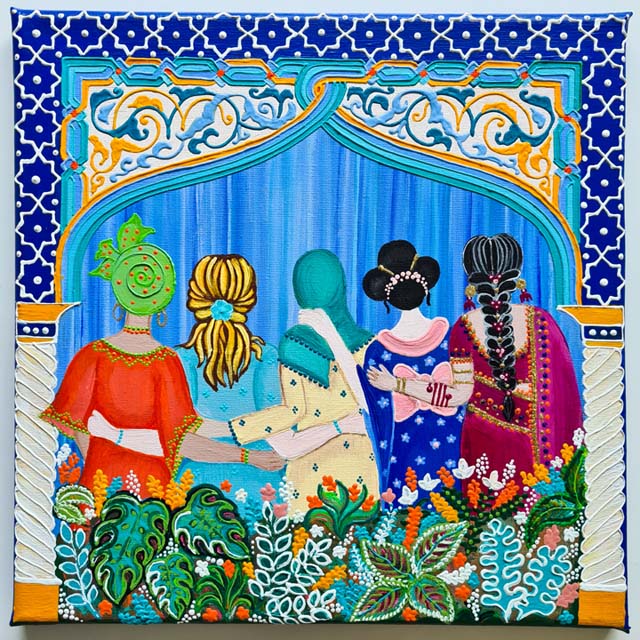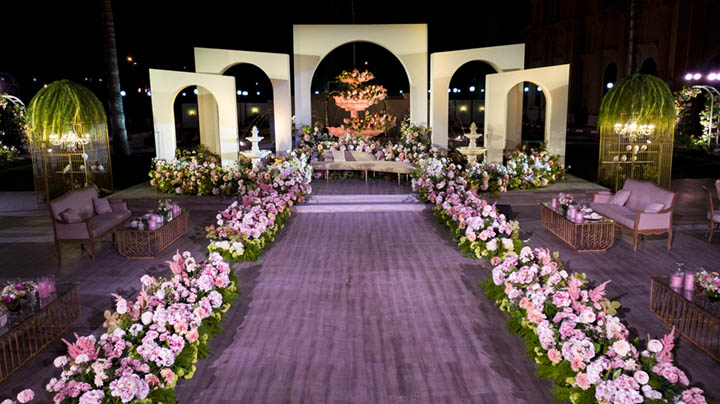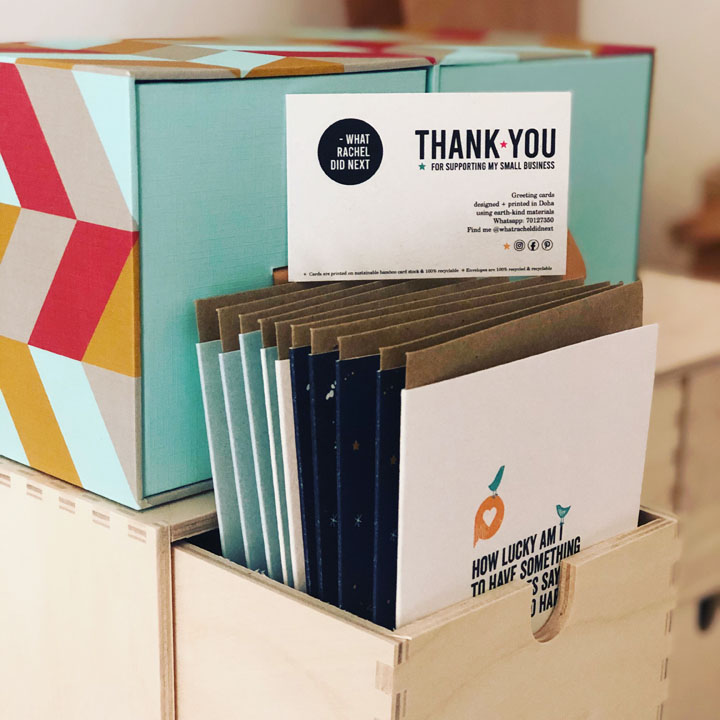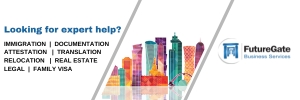Lots of new people move to Qatar every year. The majority, of course, come to work in jobs across a variety of sectors. Their spouses, however, may arrive having given up lucrative careers elsewhere in the world and find themselves looking for something to do. Setting up a small business is a logical step for many creative expats, but unfortunately, it isn’t always straightforward or easy. We talk to three female business owners to hear their stories.
Faiza Nakib – Dots and Curves
Algerian-born Faiza has lived in Algeria, Egypt, Canada, and Qatar. With a PhD in Architecture, a busy career, and two children, she arrived in Doha in 2015 knowing she was ready for a change.
That change took a while. In her first year, she defended her PhD thesis and gave birth to her third child before taking a career break. She realised that with her busy life, she needed to reevaluate her priorities and nourish her creative side.
Faiza started painting. “At first, it was just a hobby,” she says. “I didn’t think about selling my work.” Then, she participated in a popular local market and realised she wanted to do more. She got involved with QatART, a community of Qatar-based makers of art, crafts, and designs that ran popular open-air markets in Katara pre-pandemic. Over time, she developed a fan base that came to the markets to buy her original paintings, handmade home decor items, and fine art prints. Some began to ask about buying her work directly.
At the time, Faiza discovered the only option to register her business, Dots and Curves, with the Ministry of Trade and Commerce was to create a company with a Qatari partner and split the ownership 51/49. “There was nothing for small scale businesses,” she says. “What they think of as ‘small business’ can be considered as a big-scale business for us!” Over time, the legal requirements of running a small business in Qatar evolved. In 2016, there was a development that allowed small Qatari businesses to operate from their homes, but there was still little for expat-run, small-scale businesses.
Faiza went first to Bedaya, a community organisation offering free advice to home-based businesses and small start-ups. “I wanted to be assured I [wasn’t] doing anything wrong,” she explains. The people at Bedaya explained that artists need not register with the Ministry because of their unique products and low profits. Then, she was approached by Mahara, an arts organisation that facilitates registration for businesses like Faiza’s. She also discovered Qatar Foundation’s Education City Marketplace, a legal and fully registered electronic platform for promoting and selling handmade creations and art.
Today, Dots and Curves is registered through Mahara and Education City Marketplace, and Faiza is busy growing her business. She does worry if the rules will change in future, leaving her unable to operate but, despite this, she’s glad she found a way to make things work. Her pieces have proved popular even through the pandemic, and her business is doing well. She continues to consider legal partnerships with people who value her art and the importance of connecting with her customers.
When asked what advice she has for anyone wanting to set up a small business in Qatar, Faiza recommends connecting with people who have gone through the process and can help navigate the regulations. She adds that businesses need a niche to stand out. Most importantly, she says finding something she enjoyed was critical to making the business a success. “It’s something that really makes me happy,” she comments. “It has made me more aware and connected to myself, more aligned to my values and principles.”
Faiza realises she’s fortunate to be able to enjoy the flexibility that comes with owning a small business. She has also learnt a lot about her own priorities. “I don’t know if I will go back to my [architecture] work,” she says. “It was more profitable, but I realise there is much value in doing something that makes me happier and offers me flexibility. For me, profit is not always financial.”
Faiza Nakib is an artist and designer, and the creator of Dots & Curves. Faiza’s original paintings, handmade home decor items, and fine art prints have been offered by Qatar Museums, Gift Shed, West Elm, Katara Art Center, Education City Marketplace, and local fairs and markets. QatART is running small markets in Katara again—check their Facebook page for details.

Martina Hohnjec – Soigné Production
A photography enthusiast since high school, Martina Hohnjec was in her second year of university when she announced she was dropping out to pursue a career in wedding photography. “I realised I really enjoy photographing people in love and love in general,” she says. “I’ve been doing that ever since.”
When she was 22, Martina left Croatia and moved to Cyprus, where she established a business. Three years later, after visiting friends in Doha, she relocated to Qatar, figuring she had nothing to lose. “I’m not married, and I don’t have kids,” she says. “I knew if I didn’t like it, I could just go back.”
At first, she worked for a local company, but Martina’s dream was to own her own business again. After a few years, she and a former Qatari client set up Soigné Production when they saw a gap in the market for a more customer-focused business model.

“We work with more open-minded brides,” she explains. Her company offers free initial consultations, which Martina says helps her understand if it will be a good partnership. “This is the part where a lot drop out and that’s fine,” she says. “Some people don’t care enough for me to guide them through what they need. They just want to see a price list.” Martina believes that understanding what clients want and how she can help make their day even more special differentiates Soigné Production from its competition. One of her biggest struggles is collaborating with other suppliers who don’t think outside the box. “You can’t do the same thing every time because every situation is different. If I see something can be better, we should make it better. Not everyone sees it like that which I don’t think is fair to the customers. It’s not how business should be done.”
Setting up the company hasn’t been easy, and the pandemic has made it even harder. “We weren’t familiar with the bureaucracy,” she says. “We thought the process would be easier and had been told it could all be done on a website, but that’s not actually the case.” Martina and her business partner were often given conflicting information. Plus, the pandemic induced work-from-home situation meant many ministry employees weren’t always available. “At one point it was like, seriously, did we even make a good decision?” She laughs. “But as restrictions have slowly lifted and events started to happen again, we started working while sorting whatever we needed to sort.” Eventually, they got there, although there are still some details to iron out. The upside, she says, is how much they learnt in the process, meaning if they wanted to set up another business, it would be more straightforward.
Martina believes there are huge opportunities for creating a new business in Qatar. “It’s easier for people to notice you and find [out] about you in Doha because it’s a smaller place,” she explains. “If you’re doing something and you’re doing it well, there are lots of opportunities.” She says being adaptable and resourceful is essential in a country where you can’t always find high-quality suppliers available. Consequently, she has taught herself graphic design, website design, marketing, editing, shooting, and directing. “In the last five years, I’ve learned to do many things I would have outsourced in Europe.”
Martina’s biggest piece of advice for others looking to set up their own business is this: “Be realistic, know when to push and when to stop. But if you know that you’re good at something, and that you bring value to people’s lives no matter what you do, then go and do it. Follow your instinct.”
Martina Hohnjec is a photographer by heart and trade. She loves capturing images that will make people smile and last a lifetime. Her co-owned company, Soigné Production, is a Qatari and European owned wedding production company created out of a passion for helping others make the process of entering a new chapter of their lives easier and more stress-free.
Rachel Foley – What Rachel Did Next
When Rachel Foley moved from Dublin to Doha in 2017, she left behind a decade-long career in a busy creative department of an advertising company. This move brought her closer to her long-term dream of working for herself. “When I started to have kids, I started thinking I’d rather work for myself to make it easier to juggle everything,” she says. Before she moved, Rachel started down that path, doing graphic design for private clients in her free time. She knew she would have left advertising at some point even if she hadn’t relocated to Qatar with her husband and young kids, but the move was a real catalyst for her to change careers sooner rather than later.
Rachel moved into graphic design, working first for Doha Family and then for Doha College part-time. She set up her eco-friendly card making and print art company, What Rachel Did Next, in September 2020. “I suppose last winter was my first go at it,” she explains. “I mainly did cards, and it went really well. I had a great Christmas.”
Her good start was short-lived. Early in 2021, new legislation was released, and non-registered small businesses were even less able to operate. “I got really nervous and completely pulled back,” she says. “But then a friend asked me to do a leaving poster for her friend and I started doing prints as well as the cards.” Rachel continued to make cards and prints for friends, and her work grew in popularity. She was able to sell her cards through licensed sellers such as Cards In Qatar and Torba. Still, the scope to really grow her business was limited without registering it.

While away for the summer, Rachel thought hard about her options and decided she definitely wanted to pursue her dream. She returned to Qatar to work out what she needed to do.
Rachel heard about Mahara and recently decided to register with them to sell her cards and prints in her own right. In the meantime, she has been in the process of establishing suppliers for her business.
“It’s not straightforward,” she says. “I drove around the industrial area talking to printers to find the best sustainable paper to use for nearly three weeks!” She would call places who said they had the eco-friendly paper she wanted to use, only to find they didn’t, or do a print run with one supplier and then realise they were out of stock the next time. She also discovered that eco plastic wrapping made out of vegetable starch that many cooler countries use melts in the heat, making it useless for Qatar-based companies.
“There are some things that I just can’t do from here,” she adds. While her peers in Europe and the US use platforms such as etsy.com and notonthehighstreet.com to gain virtual footfall, she finds that the postal system in Qatar isn’t as reliable. As such, her online presence is very reliant on social media. “I wish I’d known more about that when I started. I would have taken a course.”
Still, Rachel is pleased with how things have progressed and enjoys the flexibility she gets from owning her own company. Looking at the bright side of some of her challenges, she says she loves meeting all her customers in person. “I’ve never been able to make delivery work financially,” she says. “So, it’s made me meet a lot of people that I wouldn’t have met before. Now I know people from all over Qatar and I love that part.”
Rachel Foley is an Irish graphic designer and small business owner in Qatar. Her company, What Rachel Did Next, designs and prints earth-friendly greeting cards in Doha. A selection of Rachel’s products can be found via Torba and Cards in Qatar (also soon to be available through Education City MarketPlace). You can view the full range online via social media @whatracheldidnext.
Top Expat Business Tips
- Network: research people who have similar businesses and find out how they set themselves up. You’ll make some new friends and have industry contacts for the future too!
- Use the language: while Arabic might not be necessary for day-to-day operations, it can be really helpful for the registration process. If you don’t speak Arabic, ask a friend who does if they can help you.
- Be realistic: setting up a company anywhere can be a long and arduous task, but this is especially true when it isn’t your home country. Set realistic goals for establishing your business.
- Get educated: being a small business owner means being an expert in lots of areas. Know the basics of everything from web design and social media strategies to marketing and accounting to ensure your company’s success.
- Find a niche: make your product or service stand out from the crowd. While a small niche might appear to reduce your potential customer base, it actually allows you to target your ideal client more accurately.
- Follow your dreams: when you create something with passion, it shows through in the company you set up. Being authentic and true to your values will give you the strength to build a business that you love.



